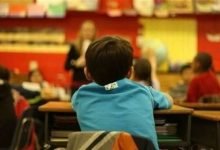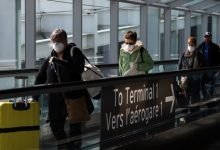‘Flat-out incorrect’: Anti-lockdown ‘rant’ from associate biology professor draws ire of Sask. scientists
An associate professor of biology in Saskatchewan has raised the ire of other scientists after he claimed that most people in the province had already contracted the novel coronavirus and recovered from it, rendering the COVID-19 lockdown unnecessary.
Experts are criticizing Josef Buttigieg of the University of Regina, who specializes in neurobiology and stem cell physiology, for social media posts that cast doubt on the province’s physical distancing measures and the competence of Saskatchewan health officials.
In a widely shared video posted on April 8, Buttigieg said the Saskatchewan Health Authority (SHA) has demonstrated “gross ineptness” in its handling of the pandemic because it has been unwilling to conduct or approve antibody testing.
“Why are they not listening to alternate hypothesis and alternate theories?” Buttigieg said in an April 13 interview with CBC News.
Buttigieg said antibody tests are a simple way to evaluate if his theory that most people in Saskatchewan have already had the virus is correct.
Antibody blood tests detect the presence of antibodies that form in the wake of an infection and can help identify who has had the virus and recovered.
They differ from nasal swab tests, which detect an active infection and help public health authorities track and curb the spread of the disease.
“The outcome of this test is going to show that the vast majority of the population has already had the virus, meaning that social isolation is 1) not necessary and 2) didn’t work as well as we thought it would,” Buttigieg wrote in an April 2 post on Facebook.
‘Wishful thinking’
Experts consulted by CBC agreed that if 60 per cent to 70 per cent of the population had COVID-19 antibodies, that should stop the virus from spreading as widely or as quickly. It’s a concept known as herd immunity.
But Hassan Masri, a Saskatoon-based physician and associate professor of medicine at the University of Saskatchewan, said Buttigieg’s claim is “just wishful thinking” and that COVID-19 studies from around the world have shown no comparable rates of infection.
“It is not an evidence-driven claim at all,” he told CBC News. “The claims are flat-out incorrect … But also, they’re misguided in their timing, spreading mistrust among society.”
Masri was so concerned about what Buttigieg was saying in his video that he posted a Facebook video of his own, refuting the claims.
Antibody testing plan in the works
Saskatchewan’s chief medical health officer, Saqib Shahab, confirmed at a news conference on April 11 that Saskatchewan is working on a plan for antibody testing.
Buttigieg told CBC News he was “elated” to learn that news.
He said he wishes someone had told him that when he started asking about the issue weeks ago, as this whole “storm” could have been avoided.
Researchers around the world are conducting antibody testing, but the scientific community is also raising some doubts about the reliability of such tests, which are susceptible to false positives.
Health Canada has not yet approved COVID-19 antibody tests, in part because of those concerns.
Additionally, in a scientific brief released Friday, the World Health Organization warned that it is not yet clear to what extent the antibody response to the virus protects against re-infection
“We expect that most people who are infected with #COVID19 will develop an antibody response that will provide some level of protection. What we don’t yet know is the level of protection or how long it will last,” the agency tweeted.
Few cases and slow growth
Buttigieg has theorized that the diminishing number of new cases in Saskatchewan suggests his view may better account for what is actually happening than the models put forth by the Saskatchewan Health Authority.
In its most modest estimate, released April 8, the SHA projected that Saskatchewan would see 153,000 people infected and slightly more than 3,000 people die of COVID-19, the illness caused by the novel coronavirus.
That same day, Buttigieg posted a video to Facebook in which he claimed the evidence ran counter to the official projection.
He said that instead of a spike in new cases, Saskatchewan was seeing a decrease.
“We should be seeing a spike of 30 to 40 new cases a day. Not seven. Not six. Not five,” he said. “And what’s going to happen over the next couple of days — we’re going to see those numbers here in Saskatchewan again start to trail off and start to go to the bottom of that curve. And the reason being is, like I said, most of us have already been infected.”
Since he posted that video, the number of new cases has remained low. As of Sunday, the province had 353 confirmed cases and four deaths.
Experts consulted by CBC say that’s not because most of us have already had the disease but because the virus arrived here later than in other places in North America, which allowed Saskatchewan to implement aggressive physical distancing measures relatively early.
“Social distancing measures have worked,” Cory Neudorf, an epidemiologist at the University of Saskatchewan in Saskatoon, told CBC News.
“We were able to get on top of this earlier because it hit us later, and therefore, despite the fact that we’re doing more and more testing of mildly ill people, we’re not picking up higher and higher rates of positives.”
In his April 8 video, Buttigieg said, “Who knows? Maybe I’m wrong, and the government’s right, in which case good luck to you all. But I’m willing to bet that my hypothesis is correct.”
Video gets about 40,000 views
In the space of a week, about 40,000 people watched Buttigieg’s video on Facebook, with about 1,500 sharing it and dozens commenting.
Some commenters praised Buttigieg for casting doubt on the science behind the lockdown.
He acknowledges that some of those people have seized on his video to advance their own agendas.
He said he is inexperienced on Facebook and didn’t realize his video was going to travel like it did.
“I should most definitely have been more careful with the choices of my words,” he told CBC News.
“I never assumed that individuals, especially from the tinfoil hat crowd, would start taking and skewing this completely.”
Buttigieg said that in addition to feedback from supporters, he also heard loud and clear from critics.
Because of those criticisms, he has deleted the April 8 video and several other Facebook posts.
While he still maintains many of his views and continues to push for antibody testing, he says he regrets the way he expressed his views.
“I don’t want to offend other people and to hurt other people’s feelings and make them think that I am a pseudoscientist that is peddling false information,” Buttigieg said in an April 14 video posted to Facebook.
Experts critique Buttigieg’s claims
CBC News asked Masri, Neudorf and Nazeem Muhajarine, an epidemiologist at the University of Saskatchewan, to assess some of the claims made in Buttigieg’s video.
They raised a range of concerns.
They said Buttigieg has:
- Put forward an imprecise, ill-defined hypothesis.
- Overestimated the spread of the virus without evidence.
- Dangerously cast doubt on the benefits of physical distancing in the midst of a pandemic.
- Unjustifiably undermined the authority and expertise of the officials leading Saskatchewan’s public health response to COVID-19.
Criticism 1: An ill-defined hypothesis
The experts said Buttigieg is unclear about precisely what he’s claiming.
On at least four occasions in the 15-minute video, he hypothesizes that “most” people in the province of around 1.1 million have already been infected and recovered.
“We’re finding that a lot of countries are not doing the social isolation, not handicapping their economy, they’re doing just fine,” he said. “So, it would suggest that most people already have been infected.”
Yet at other times in his video, he makes less-sweeping claims, such as:
- “We’re already at 200,000 to 300,000 people that have been infected out here, full stop.”
- “I’m willing to bet that about 40 per cent of the individuals, at least in my circle, have already been infected with this.”
In an interview with CBC News on April 11, he hypothesized that 10 per cent to 20 per cent of the population have had COVID-19.
Masri said the discrepancy is baffling.
“For me to have such a hypothesis and then have an error [margin] plus or minus 300,000 people is mind-blowing. That’s one-quarter of the province that you’re talking about as plus-minus,” he said.
Neudorf echoed those concerns, saying Buttigieg’s claims are “not internally consistent, so I’m not sure what his hypothesis is.”
In an April 13 interview, CBC News asked Buttigieg to explain these discrepancies. He said he misspoke when he said “most” people had the virus.
“The hypothesis that I am sticking with is that about 200,000 people in the province would have already been exposed to this virus and are probably carrying the antibodies for it.”
Muhajarine said that even in that case, physical distancing would still be required because the province would be nowhere near herd immunity.
Criticism 2: Overestimating the spread of the virus
In his April 8 video, Buttigieg said the SHA mistakenly believes that the virus is in the early stages of its spread in Saskatchewan and only a small proportion of the population has had it. He said that view is based on an incorrect belief that the virus only recently arrived in Saskatchewan.
“I don’t know why they can’t get it through their heads that this virus has been around for the last six months now at this point,” he said in his video.
Saskatchewan’s first presumptive case of COVID-19 was announced March 12.
Buttigieg says COVID-19 likely arrived in Saskatchewan in January and most, or many, people here have had the disease, meaning the province is now on the back end of the viral curve.
He said that’s why Saskatchewan is seeing such slow growth in infections. On some days, there are more people recovering than confirmed new cases.
Masri said the reason Saskatchewan’s cases are declining is because the province has been practising physical distancing. He said even the lower end of Buttigieg’s estimate — 200,000 people infected — is doubtful.
He said Buttigieg’s estimates have “not been matched by any study anywhere in the world,” including a recent one using antibody tests in Santa Clara County in California.
In that study, public health officials along with researchers from Stanford University and the University of Southern California tested about 3,000 people and found the novel coronavirus antibody was present in about two and a half to four per cent of them.
“It’s not 50 or 40 or 30 or 80 per cent — that we know,” Masri said.
Masri said it’s likely that the number of people infected in Santa Clara County would be higher than in Saskatchewan given it is one of California’s most densely populated counties and would likely have seen more infected international travellers than Saskatchewan early in the pandemic.
Neudorf said that it is likely that the Santa Clara County results are an overestimate of the infection rate because the testing technology is new and susceptible to false positives.
“You can see sometimes an artificial doubling of what the actual case count is because of false positives,” Neudorf said.
In a preliminary antibody study released this week in New York state — one of the hardest-hit regions in the world — almost 14 per cent of the population tested positive, about 10 times the number of confirmed cases.
‘Modelling is an inexact science’
Neudorf said that while he disagrees with Buttigieg’s hypothesis about the rate of infection in Saskatchewan, he agrees that far more people have likely been infected than the official count.
To date, Saskatchewan has conducted almost 28,000 nasal swab tests, which is more per capita than most provinces in Canada, including B.C. and Ontario, but mapping the full scope of the outbreak is challenging.
“Modelling is an inexact science,” said Neudorf. “Numbers could be off by a factor of 10 or even a factor of 100.”
Based on his review of studies in other jurisdictions, Neudorf suspects around one per cent of the province has been infected at some point, which would mean about 11,000 people.
Buttigieg acknowledged to CBC that his theory led him to an incorrect conclusion in at least one case.
In an April 2 Facebook post, he predicted that the COVID-19 outbreak in the U.K. was about to fizzle.
CBC








Redes Sociais - Comentários